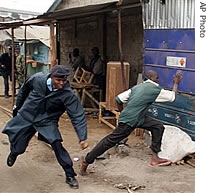2007年VOA标准英语-Nairobi Slum Dwellers Suffer After Police Cut E
搜索关注在线英语听力室公众号:tingroom,领取免费英语资料大礼包。
(单词翻译)
By Nick WadhamsNairobi
20 July 2007
The hundreds of thousands of people who live in one of Africa's largest slums are suffering new hardship after police cut electricity and water as they try to crack down on criminal gangs. As Nick Wadhams reports from our East Africa bureau, the campaign has increased the dangers faced by women and children in the slum.
 |
| A police officer chase a man accused of throwing stones at police as officials disconnected illegal electricity connections in the Mathare slum in Nairobi, Kenya, 19 July 2007 |
Kenyan authorities have drawn1 accusations2 that their campaign is heavy-handed and indiscriminate and that most of the arrested have nothing to do with the Mungiki. Police say the group has killed at least 27 civilians3 and 15 police since April.
After power was cut on Thursday, social workers said the people who would suffer most would be women and children. Agnes Musau is a program officer with the Child Welfare Society, which looks after children in Mathare.
"Most of them are extremely, extremely poor. In fact, what happens, some of them go to learn with the electricity borrowed from others," said Musau. "You know they move to one house where that family can afford electricity, they sit as a group, they are able to read, they are able to do their homework, then they can go back to their houses, that is one person benefiting the others. So to me it has an impact on the child's right to education."
The electricity cutoff came after police clashed with residents in the slum earlier on Thursday. People threw stones at police, who fired into the air. Several residents were arrested.
Musau and others in Mathare believe the police crackdown is politically motivated. Kenya is expected to hold elections later this year, when President Mwai Kibaki will seek a second term. Some members of the Mungiki have reportedly threatened to disrupt the vote.
Musau says the decision to cut electricity to parts of the slum will encourage what she says is a largely hidden threat to children there: sexual abuse.
"In Mathare, I would say it is silent thing, but most of the children especially the bigger ones between 10 and 15 years, if you go through, most of these children have been silently sexually abused," said Musau. "Now if they move from those houses, what protection are they exposed to? What protection?"
An estimated 60 percent of Nairobi's three million people live in slums. Mathare sits just two miles from Nairobi's city center. Hundreds of people fled the slum late last year during clashes between the Mungiki and a rival gang, known as the Taliban, which is not related to the militant4 group in Afghanistan. Several people were reported killed.
 收听单词发音
收听单词发音 




